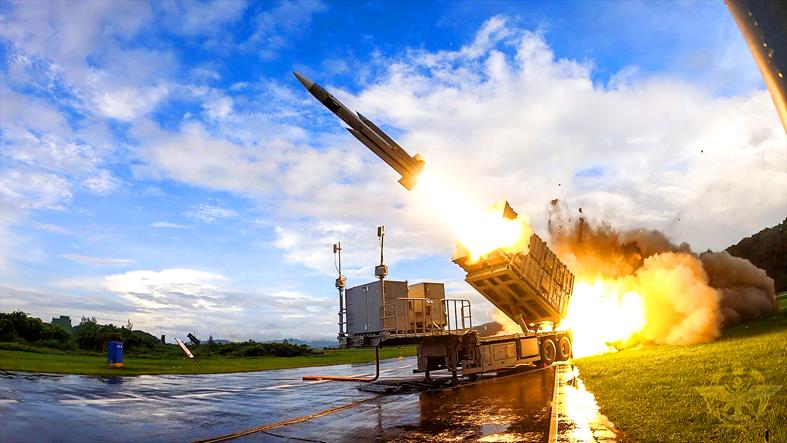The Ministry of National Defense plans to counter the Chinese navy by producing more than 1,000 anti-ship missiles over the next five years, a defense official familiar with the matter said yesterday.
The comments came after China’s People’s Liberation Army Navy began a series of military drills in a simulated naval blockade of Taiwan proper following a visit to Taipei by US House of Representatives Speaker Nancy Pelosi.
Although China has in the past few years rapidly produced many warships and added them to its navy, these large vessels are more suited for warfare on the open sea than in the narrow confines of the Taiwan Strait, the official said on condition of anonymity.

Photo: EPA-EFE
Taiwan’s radar systems and anti-ship missile units can track large or medium-sized warships with relative ease in waters near its stations, a capability proven by their performance during China’s naval drills and other activities, the official said.
China’s 052-class guided-missile destroyers can be rendered combat ineffective or sunk after being struck by four anti-ship missiles, while two missiles should suffice for smaller craft, the official said, citing analysts.
Torpedoes that strike a ship below its waterline would cause greater damage than missiles, the official said.
As the Sea-Air Combat Power Improvement Plan enters into effect, Taiwan is initiating the mass production of locally designed missiles from this year to 2026, the source said.
Under the five-year plan, the Chungshan Institute of Science and Technology would manufacture 70 Hsiung Feng III/IIIE missiles per year, while 131 Hsiung Feng II and Hsiung Sheng missiles can be produced every year by sharing an assembly line, the source said.
In addition, Taiwan is expected to receive 100 Harpoon missile launchers and 400 missiles from the US, which would be deployed in conjunction with domestically made systems, the source said.
Taiwan’s ability to deploy multiple types of missiles would improve the kill probability of strikes on ships, ensuring that China would pay a heavy price for trying to invade, the official said.

The Central Election Commission has amended election and recall regulations to require elected office candidates to provide proof that they have no Chinese citizenship, a Cabinet report said. The commission on Oct. 29 last year revised the Measures for the Permission of Family-based Residence, Long-term Residence and Settlement of People from the Mainland Area in the Taiwan Area (大陸地區人民在台灣地區依親居留長期居留或定居許可辦法), the Executive Yuan said in a report it submitted to the legislature for review. The revision requires Chinese citizens applying for permanent residency to submit notarial documents showing that they have lost their Chinese household record and have renounced — or have never

A magnitude 5.6 earthquake struck off the coast of Yilan County at 12:37pm today, with clear shaking felt across much of northern Taiwan. There were no immediate reports of damage. The epicenter of the quake was 16.9km east-southeast of Yilan County Hall offshore at a depth of 66.8km, Central Weather Administration (CWA) data showed. The maximum intensity registered at a 4 in Yilan County’s Nanao Township (南澳) on Taiwan’s seven-tier scale. Other parts of Yilan, as well as certain areas of Hualien County, Taipei, New Taipei City, Taoyuan, Hsinchu County, Taichung and Miaoli County, recorded intensities of 3. Residents of Yilan County and Taipei received

Taiwan has secured another breakthrough in fruit exports, with jujubes, dragon fruit and lychees approved for shipment to the EU, the Ministry of Agriculture said yesterday. The Animal and Plant Health Inspection Agency on Thursday received formal notification of the approval from the EU, the ministry said, adding that the decision was expected to expand Taiwanese fruit producers’ access to high-end European markets. Taiwan exported 126 tonnes of lychees last year, valued at US$1.48 million, with Japan accounting for 102 tonnes. Other export destinations included New Zealand, Hong Kong, the US and Australia, ministry data showed. Jujube exports totaled 103 tonnes, valued at

BIG SPENDERS: Foreign investors bought the most Taiwan equities since 2005, signaling confidence that an AI boom would continue to benefit chipmakers Taiwan Semiconductor Manufacturing Co’s (TSMC, 台積電) market capitalization swelled to US$2 trillion for the first time following a 4.25 percent rally in its American depositary receipts (ADR) overnight, putting the world’s biggest contract chipmaker sixth on the list of the world’s biggest companies by market capitalization, just behind Amazon.com Inc. The site CompaniesMarketcap.com ranked TSMC ahead of Saudi Aramco and Meta Platforms Inc. The Taiwanese company’s ADRs on Tuesday surged to US$385.75 on the New York Stock Exchange, as strong demand for artificial intelligence (AI) applications led to chip supply constraints and boost revenue growth to record-breaking levels. Each TSMC ADR represents